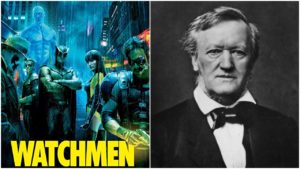
Opera Meets Film: How ‘Watchmen’ Questionably Mimics ‘Apocalypse Now’s’ Use of The Ride of the Valkyries
By Francisco Salazar“Opera Meets Film” is a feature dedicated to exploring the way that opera has been employed in cinema. We will select a section or a film in its entirety, highlighting the impact that utilizing the operatic form or sections from an opera can alter our perception of a film that we are viewing. This week’s installment features Zack Snyder’s “Watchmen.”
As of this writing, “Watchmen” is back and more popular than ever. As such, it isn’t easy to remember that the famed comic book by Alan Moore, Dave Gibbons, and John Higgins, was previously adapted to feature film by none other than Zack Snyder.
The superhero noir tells the story of a group of retired heroes during an alternate universe set during the height of the Cold War. While the film features a plethora of differing song selections, this week’s Opera Meets Film will take a look at one very specific, albeit brief scene.
Here it is.
What Snyder is attempting here can be deemed rather controversial on some levels.
Let’s get something out of the way. No one owns “The Ride of the Valkyries” from Wagner’s “Die Walküre” and it has been used throughout cinema history in a number of differing ways.
The most noted example, which we examined on this channel a few years back was in “Apocalypse Now,” but that was far from the first time. But that iconic use has become shorthand for film lovers and connoisseurs with the images of the helicopters flying over Vietnam before the raid with Wagner’s score blaring embedded in the cinematic collective conscience.
This shorthand has been such a part of cinema that we have seen other movies comment on it in their own unique ways. We saw this in “Crazy Rich Asians” and how it makes a joke out of the commentary. We saw the “Apocalypse Now” scene specifically mentioned in “The Gift” and then utilized to frightening effect.
And then there’s “Watchmen’s” use. There is no denying that Snyder is referencing “Apocalypse Now” because context dictates it as such. There is no doubt that the Comedian and Dr. Manhattan are in Vietnam, taking down the enemy with Wagner’s ever famous music blaring over the soundtrack. But in doing so, Snyder is not so much commenting on the music’s use in conversation with “Apocalypse Now” or even “Watchmen” as he is mimicking Francis Ford Coppola’s famed scene.
For cinema goers that get the reference, it allows Snyder a quick outlet to manipulate his viewers into the same emotions that are already associated with Coppola’s scene. The fact that scene lasts so little (11 shots and just over one minute), emphasizes this notion; Coppola’s scene is so renowned because of how it was built up to allow the music to unfold in consort with the imagery. Snyder’s quick visual and aural montage is aimed at a similar effect without necessarily doing the same work. He wants “Watchmen” to obtain its emotional rewards via association.
Even the narrative arc of the scene is the same as Coppola’s as Snyder moves from what should be a heroic action to a more questionable moral exploration in much the same way “Apocalypse Now” does. We see an image of the large Dr. Manhattan destroying enemy warriors; it echoes the way the soldiers pump themselves up for the raid; in these opening scenes the audience only sees their perspective and so they align with them. Helicopters fly by and then we see the Comedian firing upon a few. In the final images he murders a man begging for mercy, much like the pilots in “Apocalypse Now” take down a village of innocent people without any remorse.
Whether or not Snyder is making a comment on Wagner’s famed opera in “Watchmen,” a film that dissects and subverts the myth of superheros, is hard to say. One could argue that the use of “The Ride of the Valkyries” in this Vietnam scene is highlighting the moral grayness found in Wagner’s own Ring Cycle, especially with regards to its male heroes.
But then again, “Apocalypse Now” potentially already did that decades earlier.


